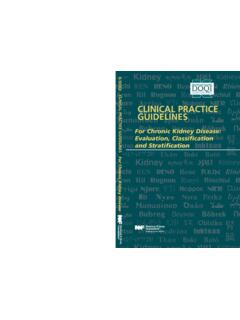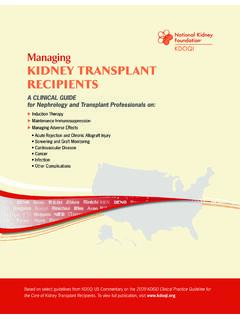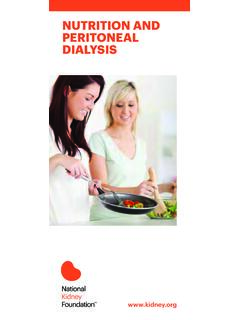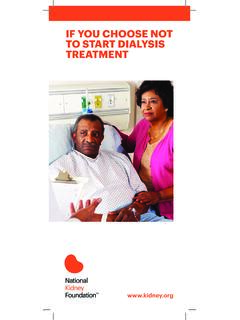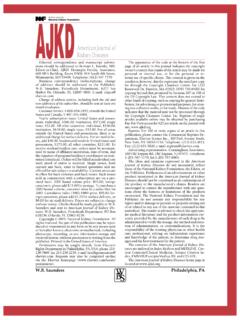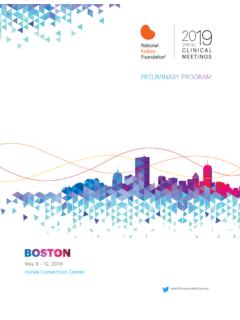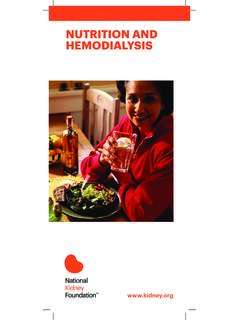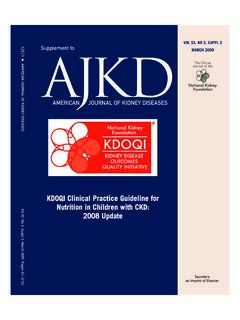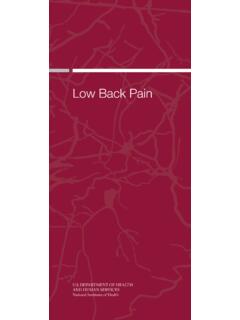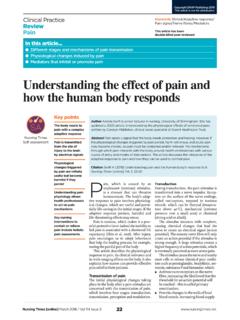Transcription of PAIN MEDICINES AND YOUR KIDNEYS - National Kidney …
1 pain MEDICINES AND YOUR KIDNEYS What You Need to Kidney FOUNDATION2 National Kidney Foundation's Kidney Disease Outcomes Quality InitiativeDid you know that the National Kidney Foundation's Kidney Disease Outcomes Quality Initiative (KDOQI ) offers guidelines and commentaries that help your doctor and healthcare team make important decisions about your medical treatment? The information in this booklet is based on those recommended of Kidney DiseaseThere are 5 stages of Kidney disease. They are shown in the table below. Your doctor determines your stage of Kidney disease, based on the presence of Kidney damage and your glomerular filtration rate (GFR), which is a measure of your level of Kidney function.
2 Your treatment is based on your stage of Kidney disease. Speak to your healthcare provider if you have any questions about your stage of Kidney disease or your OF Kidney DISEASES tageDescriptionGlomerular Filtration Rate (GFR)*1 Kidney damage ( , protein in the urine) with normal GFR90 or above2 Kidney damage with mild decrease in GFR60 to 893aMild to moderate decrease in GFR45 to 593bModerate to severe decrease in GFR30 to 444 Severe reduction in GFR15 to 295 Kidney failureLess than 15*Your GFR number tells your healthcare provider how much Kidney function you have.
3 As chronic Kidney disease progresses, your GFR number decreases. OF CONTENTSWhat are analgesics? ..5 Are pain MEDICINES safe? ..6 What are NSAIDs? ..6 Are NSAIDs safe to take? ..6 What is acetaminophen?..7Is acetaminophen safe to take? ..7Is aspirin safe for regular use? ..8 What can I do to keep my KIDNEYS healthy if I need medicine for pain ? ..9 What if I have more questions? ..11 National Kidney FOUNDATION4 Many people take pain MEDICINES to help them treat pain resulting from illness or injury. They are the most often used medicine in the United States.
4 However, pain MEDICINES can have different effects on the KIDNEYS , depending on the type of medicine, how it is used, and how well your KIDNEYS are working. This educational brochure will help answer some questions you might have about pain MEDICINES and your are analgesics? pain MEDICINES are also called analgesics. They are used to help relieve pain , but can also sometimes be used to help lower fever or inflammation (redness and swelling from an injury or illness), depending on the type of pain medicine. These benefits are important, especially for those who need them, including people with arthritis, headaches, muscle aches, colds, toothaches, menstrual cramps, and sinus of pain MEDICINES that are available over-the-counter (OTC) include aspirin, acetaminophen, ibuprofen, and naproxen sodium.
5 OTC means they are available without a prescription, but if you have Kidney disease, you should still speak to your healthcare provider about any MEDICINES before you take them. Some of these MEDICINES also come in higher strength, or dose, with a pain MEDICINES are usually available as a pill, either on its own or combined with other MEDICINES , such as certain cold and cough MEDICINES . Some pain MEDICINES are also available in a topical form, meaning they are applied on the skin as a cream, gel, or Kidney FOUNDATION6 Are pain MEDICINES safe?
6 pain MEDICINES can help relieve pain and are generally safe when taken as directed. However, as with any medicine, they can have side effects and you should use them as directed on their labels. If you do not use pain MEDICINES as directed, they may cause problems with your stomach, liver, or KIDNEYS , depending on the type, dose, and duration of pain medicine used. The harm to your KIDNEYS can be sudden, and result in acute Kidney injury (AKI). In some cases, if you stop the pain medicine you may reverse short-term harm to your KIDNEYS , meaning Kidney function may recover.
7 Continued overuse or misuse of certain pain MEDICINES can also lead to a slow loss of Kidney function over time, or chronic Kidney disease (CKD).What are NSAIDs?The term NSAID stands for nonsteroidal anti-inflammatory drug. NSAIDs are a group of pain relievers. Some NSAIDs are available OTC, including ibuprofen (for example, Advil , Motrin ), naproxen sodium (for example, Aleve ), and aspirin (for example, Bayer ). Generic versions (no brand name) of these brands are also available. people use NSAIDs to reduce fever and relieve pain . Prescription NSAIDs can be used to reduce inflammation caused by many medical problems or NSAIDs safe to take?
8 OTC NSAIDs are generally safe for occasional use when taken as directed. However, everyone should be careful not to take too much or to take them for too long. The risk of heart attack or stroke may increase if you use NSAIDs more than directed, or longer than directed. NSAIDs may cause severe stomach bleeding. The chance of stomach bleeding is higher you fall in certain groups, such as if you are age 60 or older, or if you take a blood thinning drug, steroids, or other drugs containing prescription or OTC NSAIDs. You should ask your healthcare provider before using NSAIDs if you have high blood pressure, heart disease, liver cirrhosis, or Kidney is acetaminophen?
9 Acetaminophen is an analgesic, but not part of the NSAID group. It is available OTC, branded (Tylenol ), and as a generic. people also use acetaminophen to reduce fever and relieve pain for a number of medical problems or injuries. It is not recommended to treat acetaminophen safe to take?Acetaminophen is safe and effective when used as directed by the label. Acetaminophen is not known to affect Kidney function when taken in the recommended dosage, the way other pain MEDICINES can. For this reason, it is the drug that health care providers often recommend for occasional use in patients with Kidney disease.
10 However, if you have Kidney disease you should still talk to your healthcare provider before taking any new medicine. It is important for you to know that any drug can be harmful if you exceed labeled doses or use it for longer than directed by the label. Taking more than the maximum daily dose of acetaminophen (4000 mg) can harm the liver. Severe liver damage may also occur if you take acetaminophen with other drugs containing acetaminophen or take 3 or more alcoholic drinks per day. people with liver disease, or people who drink too much alcohol, should not take acetaminophen without first talking to their healthcare provider.

